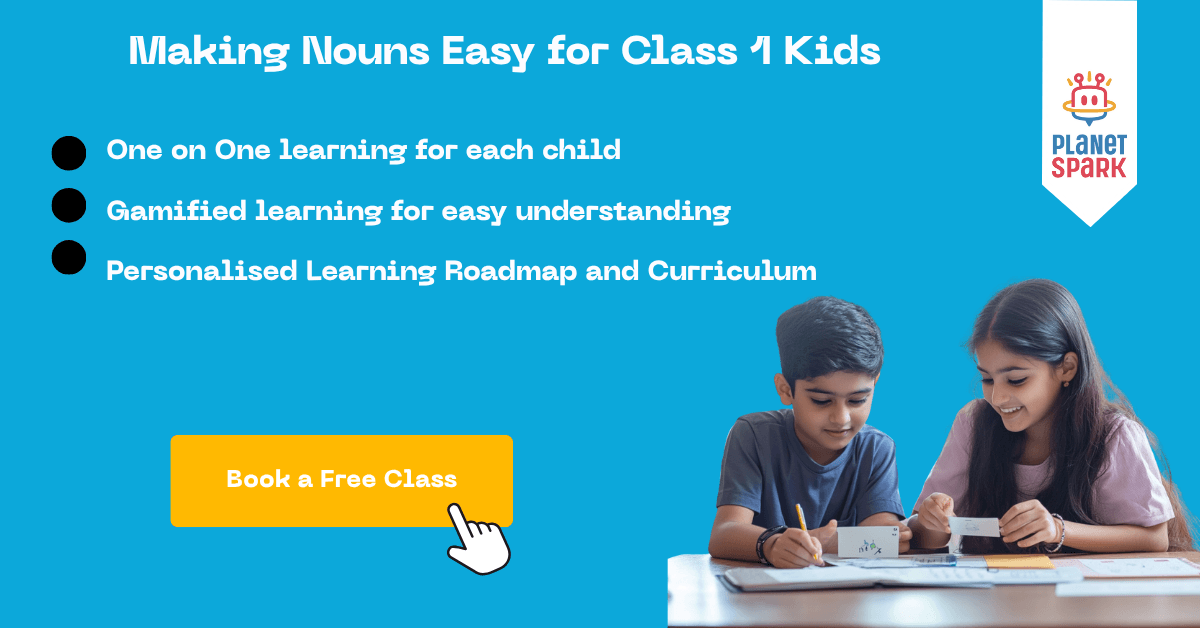English Grammar: Articles for Class 1 Kids Made Easy
Last Updated At: 7 Jul 2025
8 min read

When young learners begin exploring English grammar articles in Class 1, it's important to start with the basics for a strong foundation. Articles like "a," "an," and "the" are essential building blocks of the English language. This guide will help children understand their correct usage simply and engagingly. PlanetSpark’s English program for kids offers expert-led, interactive sessions that make grammar easy to grasp through storytelling, activities, and real-life examples.
What is an article?
The words "a," "an," and "the" are all articles, but what do they mean?
An article is a word that modifies a noun by indicating its grammatical definiteness. Articles help identify whether the noun refers to something specific or general. English uses "the" as a definite article and "a" or "an" as indefinite articles. Articles are common in many languages including Spanish, French, and German.
Types of Articles
English does have definite or indefinite articles. It is vital to understand the difference between the two.
The Definite Article
The definite article is the word the. It limits the meaning of a noun to one particular thing. It can be used with both singular and plural nouns. The definite article is used with singular and plural nouns. It can be used with countable and uncountable nouns. We use the definite article in front of a noun when we believe the listener/reader knows exactly what we are referring to:
I want to buy the book that you recommended.
The train leaves at 8 o'clock.
We refer to someone by name or something by using a proper noun, for example:
I visited my friend, Jennifer, last week.
We visited New York City last month.
If we use a common noun (not a proper noun), we use the definite article:
I saw a film last night. (Not, I saw film last night.)
The ship sailed down the river. (Not, Ship sailed down river.)
The Indefinite Article
An indefinite article is the word “a” or “an.” You use the indefinite article when you do not know or do not need to say precisely what person or thing you are referring to. The indefinite article is only used when referring to a singular count noun in English.
The correct choice, whether to use a or an, is determined by the initial sound of the word that follows the article, not by the word's spelling. This is because pronunciation, not spelling, governs the choice of the indefinite article. In speech and informal writing, especially on the internet, an occasionally precedes words that begin with a consonant sound, but this usage is regarded as nonstandard.
The form “an” is used before words that start with a vowel sound (a, e, i, o, u), and the form “a” is used before words that begin with a consonant sound (all the other letters).
The indefinite article is the word "a," meaning one. It is used before nouns that are singular and begin with a consonant sound.
An indefinite article is used when you talk about something in general or introduce something new to a conversation and don't want to be specific. For example:
I need to go to the store for a gallon of milk. (It doesn't matter which gallon of milk.)
I saw a man running in the park this morning. (You don't know anything else about the man.)
- Please hand me a book; any book will do.
- Please hand me an autobiography; any autobiography will do.
Exceptions: Choosing A or An
The general rule of using a before a word that starts with a consonant and before a word that begins with a vowel has a few exceptions. When it comes to honor, for example, first letter resembles a consonant, but it is unpronounced. While the word honor has a vowel sound, its spelling suggests otherwise. These rules are a crucial part of CBSE class 1 English grammar articles. For this reason, we use an. To illustrate, take the following sentence:
My mother is an honest woman.
When the first letter of a word comes after a consonant sound, use a, as shown in the sample sentence below:
She is a United workers staff.
Article Before an Adjective
An article before an adjective is used to show whether the noun (person/thing) being referred to is specific or unspecific.
When you use 'a' or 'an', you are referring to a singular countable noun in a general sense. This means that you could be referring to any group member that includes all similar things.
For example,
A cow is a domestic animal.
In this sentence, you are referring to cows in general. You could be talking about any cow in the world.
When you use 'the,' you refer to something specific that has already been mentioned or that both you and your listener know about. It can also refer to something unique like the moon, the earth, etc. So, it cannot be used with plural nouns and uncountable nouns.
For example,
The cow I saw yesterday was white in color.
Here, you refer to a particular cow that both you and your listener know about or have seen earlier.

Using Articles with Pronouns
If you refer to a specific or nonspecific item, use the possessive pronoun to indicate. In our research, articles also denote specificity. Readers might become confused when possessive prepositions and articles occur at the same time. These are some examples of class 2 English use of articles. Since possessive pronouns are words such as his, hers, theirs, and theirs, it is relatively simple to distinguish them. A possessive pronoun should not be used when discussing an article. Below is a brief look at what I mean.
Why are you reading the my book?
The word the and its variant, my, are both used as modifiers of the same noun, so it is not appropriate to combine them. Choosing one of the following options can ensure the intended meaning is conveyed:
Why English Grammar Articles for class 1?
Articles in English Grammar 1 are words used before nouns. There are two types of articles. Indefinite and definite articles are the first and second types. The English language has a unique system of articles due to its complexity, unlike any other language. However, if you want to learn articles in grammar, you can benefit from this topic, which will give you a better understanding of what words should be used in articles and how they should be arranged.

How to Make Grammar Fun for Kids?
English grammar can be made more exciting and enjoyable for children in various ways. Here are some suggestions:
Having a fun way to teach them about colors, like playing games with them, will make it even more enjoyable for them. Children love playing with colors. When teaching your children something, use games to help them learn because it is human nature to learn things quickly and easily if they sound fun and interesting to us. Give grammar rules different names according to various games, and have them understand them.
Ideas for Making it Interesting
Another approach could be to use the opposites of that word to teach them the same things. Do not use words like big, slow, and easy when discussing things that are the opposite of those. This will also teach them the antonyms of the various words.
If your child can make a silly sentence that makes some grammatical sense, have them use it.
To help the kids learn articles in grammar and some amazing new things, consider using some great online resources and games. As well as watching a lot of Youtube videos each day, you can get them to grasp new concepts. You can also use YouTube videos to learn about topics that are new to you.
Conclusion
English Grammar is a significant part of language learning. This article is for beginners and helps to learn English Grammar Articles for class 1. Generally, we learn grammar before learning vocabulary to easily understand the content in sentences. We study English articles like indefinite articles, definite articles, and zero articles to learn which noun needs an article and which one doesn't. We can also read articles on verb tenses like past and present tense and their uses in context.
FAQs
Q1. What is an article?
A special word called an article appears before a noun to indicate whether it is a specific or a general term. The article the is used for specific nouns while a is used for general nouns (or an if the next word starts with a vowel sound).
Q2. What is an example of an article in grammar?
"A hammer" refers to any hammer, although "the hammer" refers to only one hammer.
Q3. Is there a time when we should not use articles?
To not misuse articles when talking about uncountable nouns or possessive pronouns, you should not use them. Those nouns that refer to abstract ideas, for example, nationalities, school subjects, and sports, do not always require the use of articles.
Q4. What are definite and indefinite articles?
Articles describing something specific or general can be defined as definite or indefinite. As far as the definite article is concerned, this is "the," whereas "a" and "an" are definite, indefinite articles.
Q5. How do you identify articles?
Articles such as A, An, and The are used before all types of nouns.
Q6. Can you tell me more about where Articles are used?
The article comes before a noun in English grammar.
Personalized Communication Report
Record a video to get a AI generated personalized communication report for your child
Select Learner's Class

Hi There, want to try these
tips for your child with
LIVE with our expert coach?
Let's check your child's
English fluency
